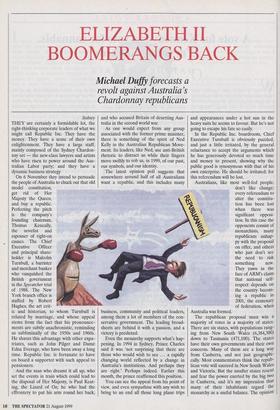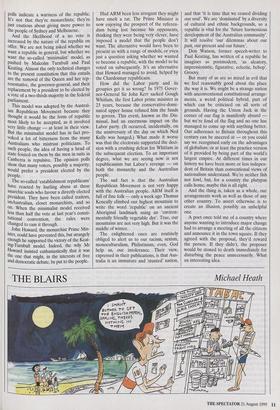ELIZABETH II BOOMERANGS BACK
Michael Duffy forecasts a
revolt against Australia's Chardonnay republicans
Sydney THEY are certainly a formidable lot, the right-thinking corporate leaders of what we might call Republic Inc. They have the money. They have a sense of their own enlightenment. They have a large staff, mainly composed of the Sydney Chardon- nay set — the new-class lawyers and artists who have risen to power around the Aus- tralian Labor party; and they have a dynamic business strategy On 6 November they intend to persuade the people of Australia to chuck out that old model constitution, get rid of Her Majesty the Queen, and buy a republic. Perfecting the pitch is the company's founding chairman, Thomas Keneally, the novelist and espouser of right-on causes. The Chief Executive Officer and principal share- holder is Malcolm Turnbull, a barrister and merchant banker who vanquished the British government in the Spycatcher trial of 1988. The New York branch office is staffed by Robert Hughes, the art crit- ic and historian, to whom Turnbull is related by marriage, and whose appeal stems from the fact that his pronounce- ments are subtly anachronistic, reminding us subliminally of the 1950s and 1960s. He shares this advantage with other expa- triates, such as John Pilger and Dame Edna Everage, who have been away a long time. Republic Inc. is fortunate to have on board a supporter with such appeal to pensioners.
And the man who dreamt it all up, who set the events in train which could lead to the disposal of Her Majesty, is Paul Keat- ing, the Lizard of Oz; he who had the effrontery to put his arm round her back, and who accused Britain of deserting Aus- tralia in the second world war.
As one would expect from any group associated with the former prime minister, there is something of the spirit of Ned Kelly in the Australian Republican Move- ment. Its leaders, like Ned, use anti-British rhetoric to distract us while their fingers move swiftly to rob us, in 1999, of our past, our symbols, and our identity.
The latest opinion poll suggests that somewhere around half of all Australians want a republic, and this includes many business, community and political leaders, among them a lot of members of the con- servative government. The leading broad- sheets are behind it with a passion, and a victory is predicted.
Even the monarchy supports what's hap- pening. In 1994 in Sydney, Prince Charles said it was 'not surprising that there are those who would wish to see ... a rapidly changing world reflected by a change in Australia's institutions. And perhaps they are right.' Perhaps indeed. Earlier this month, the prince reaffirmed this position.
You can see the appeal from his point of view, and even sympathise with any wish to bring to an end all those long plane trips and appearances under a hot sun in the heavy suits he seems to favour. But he's not going to escape his fate so easily.
In the Republic Inc. boardroom, Chief Executive Turnbull is obviously puzzled, and just a little irritated, by the general reluctance to accept the arguments which he has generously devoted so much time and money to present, showing why the public good is synonymous with that of his own enterprise. He should be irritated; for this referendum will be lost.
something new. They yawn in the face of ARM's claim that national self- respect depends on the country becom- ing a republic in 2001, the centenary of federation, when Australia was formed.
The republican proposal must win a majority of votes in a majority of states. There are six states, with populations rang- ing from New South Wales (6,384,300) down to Tasmania (471,100). The states have their own governments and their own concerns. Many of them are a long way from Canberra, and not just geographi- cally. Most commentators think the repub- lican vote will succeed in New South Wales and Victoria. But the smaller states resent and fear the power exerted by the big two in Canberra, and it's my impression that many of their inhabitants regard the monarchy as a useful balance. The opinion polls indicate a wariness of the republic. It's not that they're monarchists; they're just cautious about giving more power to the people of Sydney and Melbourne. And the likelihood of a no vote is increased by the nature of the republic on offer. We are not being asked whether we want a republic in general, but whether we want the so-called 'minimalist' model, as pushed by Malcolm Turnbull and Paul Keating. Almost the only technical changes to the present constitution that this entails are the removal of the Queen and her rep- resentative, the governor-general, and their replacement by a president to be elected by a vote of a two-thirds majority in the federal parliament.
This model was adopted by the Austral- ian Republican Movement because they thought it would be the form of republic most likely to be accepted, as it involved very little change — at least in their view. But the minimalist model has in fact pro- voked a lot of bitterness from the many Australians who mistrust politicians. To such people, the idea of having a head of state foisted on them by the men in suits in Canberra is repulsive. The opinion polls show that many voters, possibly a majority, would prefer a president elected by the people.
The so-called 'establishment republicans' have reacted by hurling abuse at these anarchic souls who favour a directly elected president. They have been called traitors, unAustralian, closet monarchists, and so on. When the minimalist model received less than half the vote at last year's consti- tutional convention, the rules were changed to ram it through. John Howard, the monarchist Prime Min- ister, could have prevented this, but strangely enough he supported the victory of the Keat- ing-Turnbull model. Indeed, the wily Mr Howard insisted enthusiastically that it was the one that might, in the interests of free and democratic debate, be put to the people. Had ARM been less arrogant they might have smelt a rat. The Prime Minister is now enjoying the prospect of the referen- dum being lost because his opponents, thinking they were being very clever, have imposed a model that the people don't want. The alternative would have been to present us with a range of models, or even just a question asking whether we wanted to become a republic, with the model to be voted on subsequently. It's an alternative that Howard managed to avoid, helped by the Chardonnay republicans.
How did the Labor party and its groupies get it so wrong? In 1975 Gover- nor-General Sir John Kerr sacked Gough Whitlam, the first Labor prime minister in 23 years, because the conservative-domi- nated upper house refused him the funds to govern. This event, known as the Dis- missal, had an enormous impact on the Labor party. (It occurred, incidentally, on the anniversary of the day on which Ned Kelly was hanged.) What made it worse was that the electorate supported the deci- sion with a crushing defeat for Whitlam in the subsequent election. To an important degree, what we are seeing now is not republicanism but Labor's revenge — on both the monarchy and the Australian people.
The sad fact is that the Australian Republican Movement is not very happy with the Australian people. ARM itself is full of fine folk — only a week ago Thomas Keneally climbed our highest mountain to write the word 'republic' on an ancient Aboriginal landmark using an 'environ- mentally friendly vegetable dye'. True, our mountains are not very high. But it was the middle of winter.
The enlightened ones are routinely obliged to alert us to our racism, sexism, monoculturalism, Philistinism; even, God help us, our intolerance. Their view, expressed in their publications, is that Aus- tralia is an immature and 'stunted' nation, and that 'it is time that we ceased dividing our soul'. We are 'dominated' by a diversity of cultural and ethnic backgrounds, so a republic is vital for the 'future harmonious development of the Australian community'. It will resolve 'our dilemmas about our past, our present and our future'.
Don Watson, former speech-writer to Paul Keating, has written of a republic he imagines as postmodern, 'as aleatory, impressionistic, figurative, eclectic, bebop'. Groovy.
But many of us are so mired in evil that we feel reasonably good about the place the way it is. We might be a strange nation with unconventional constitutional arrange- ments, a weird political hybrid, part of which can be criticised on all sorts of grounds. Having the Union Jack in the corner of our flag is manifestly absurd but we're fond of the flag and no one has managed to come up with anything better. Our adherence to Britain throughout this century can be sneered at — or you could say we recognised early on the advantages of globalism; or at least the practice version of it provided by being part of the world's largest empire. At different times in our history we have been more or less indepen- dent of Britain than conventional views of nationalism understand. We're neither fish nor fowl, but, for a country the platypus calls home, maybe this is all right.
And the thing is, taken as a whole, our arrangements work as well as those of any other country. To assert otherwise is to create an illusion, possibly an unhelpful one.
A poet once told me of a country where anyone wanting to introduce major change had to arrange a meeting of all the citizens and announce it in the town square. If they agreed with the proposal, they'd reward the person. If they didn't, the proposer would be stoned to death immediately for disturbing the peace unnecessarily. What an interesting idea.



























































 Previous page
Previous page